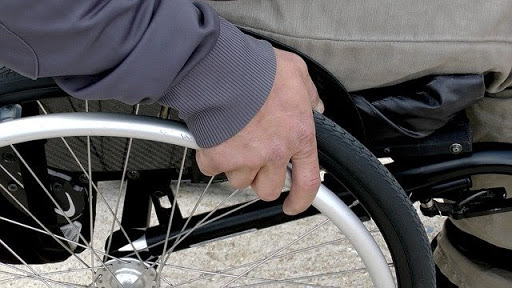People are often worried about how to deal with a disabled person. They might even feel intimidated or anxious if they need to assist them. It’s hard to know whether they want to be treated in a special manner or if they simply want to be treated just like everybody else. If you are taking care of a loved one who is disabled, or are just curious about the correct etiquette when it comes down to how to help and motivate a disabled person, read on.

Ask Before Offering Them Help
One of the most important ways you can help and motivate a disabled person is one of the most seemingly counterintuitive: to not help! At least, not before you ask whether it is okay to help them or not. Never assume that they need your assistance and always keep in mind that they know how to deal with their disability better than anyone else. If you want to support them, ask them first and make sure you understand their needs and exactly how they want you to assist them. The more specific the instructions, the better.
Ensure They Receive Their Daily Needs
In the era we are living in where a pandemic is raging on, it is incredibly important for those with disabilities to eat healthy food. This may be difficult, as leaving the house when a highly infectious disease is lurking can be life-threatening for them. Therefore, it’s important to make sure that they regularly have enough groceries in the house. A great way to help them is to teach them how to purchase their groceries online or to simply get them what they need and deliver it, as safely as possible, to their houses. You should also make sure there is someone present to cook their nourishing meals every day and have the knowledge about food thickeners to accommodate any swallowing difficulties they may have.
Adjust your Posture to Eye-Level
This tip is for you if the disabled person you are taking care of is in a wheelchair. Often, the height difference between people who are wheelchair-bound and able bodies can create an unintended feeling of superiority. To make sure you aren’t making them feel inferior, try to sit or stand at eye-level with the person with a disability if it is possible to do so. Sitting in a chair is the best way to do this. You should try to avoid kneeling as this may cause the handicapped person to feel like they are a child.
Buy Them a Power Wheelchair
Another way you can help disabled people is by buying them assistive technologies to help them become more self-reliant. For example, buying them a folding power wheelchair can help to significantly increase their mobility with minimal risk involved. Power wheelchairs today are also light and can be folded up compactly, with batteries that can keep going for more than 15 miles. Those with dual motors can also add an extra feeling of security, knowing that the motor won’t fail and leave the handicapped person stranded.

Respect their Personal Space
Respecting the personal space of someone who has a disability is crucial in order to help them. They typically don’t like anyone touching them or their equipment, or interacting with their Guide Dogs, if they have one. If you want to move their wheelchair, it’s a must to ask them for permission first. You should also always knock before you enter the room. Moreover, if they don’t talk openly about their disability, don’t bring it up. If they open up about it, don’t discuss it with anyone else, even with their care workers or family members, without their consent.
Make Them Feel Confident
A final way to motivate a person with a disability is to make them feel as confident as you can. Numerous disabled people suffer from low self esteem resulting from their condition. This is often increased due to how people act when they are around them. To help them overcome this, you should make it a note never to stare at them and to instead make eye contact with them when talking. Try to sit down whenever you talk to them and don’t strike up a conversation about their disabilities. You should also remember that the majority of them don’t want your sympathy and would prefer to be treated normally.
Many people may be uncomfortable dealing with those who have special needs for many reasons. They may feel sorry for them because of their disability or they may be afraid that they will say something offensive or treat them in a way that is abnormal and upset them. In any case, it’s important to remember that they are just people and would more often than not like to be treated as such. Asking before offering help, buying them assistive tools to help them become more independent, and respecting their personal space can go a long way to give them a boost of motivation.

